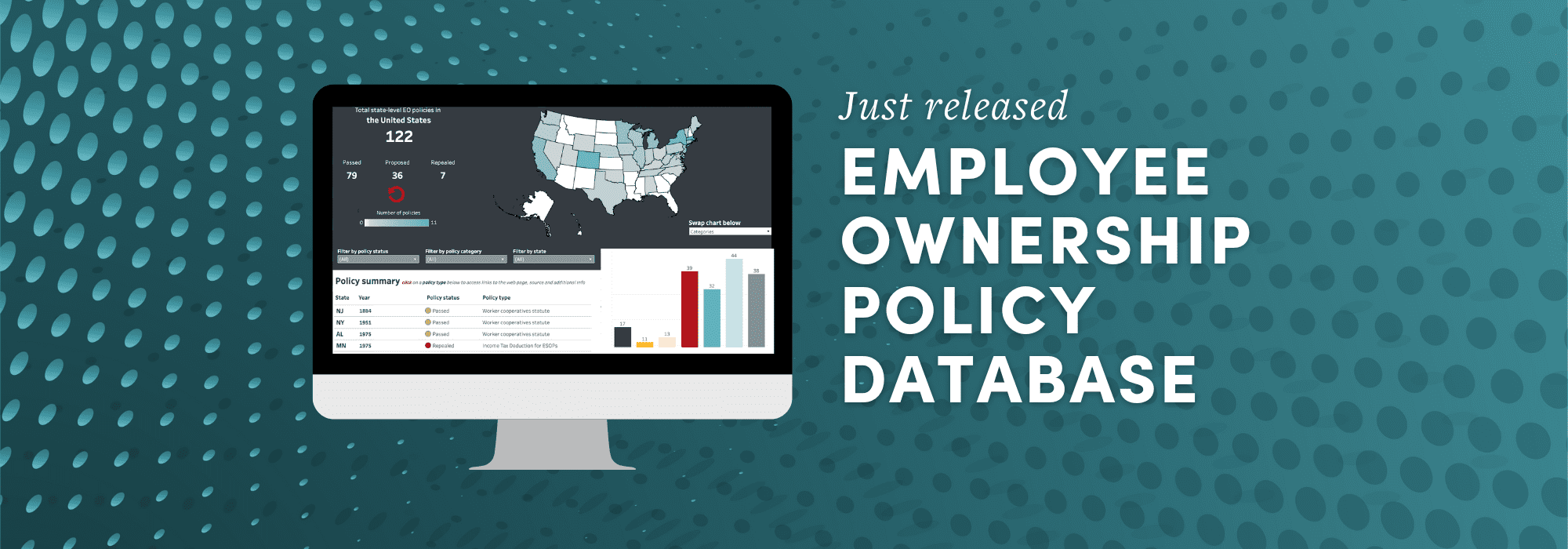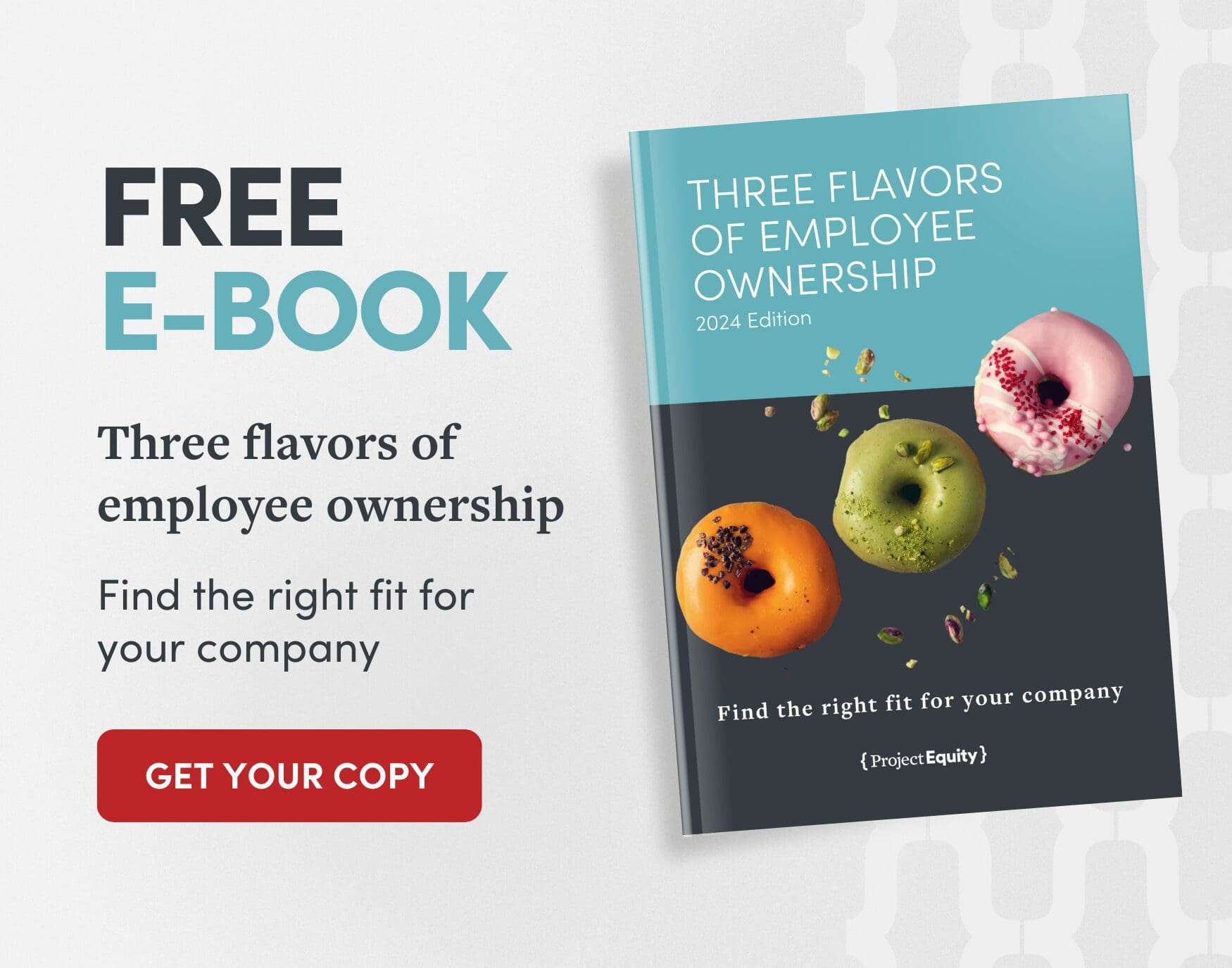Introducing Project Equity’s employee ownership policy database
- Max Chaoulideer
Did you know that:
- We’ve documented over 30 U.S. cities and counties that have passed policies to support employee ownership (EO) locally. And that 20 of those localities have dedicated funding to support those policies, amounting to more than $55 million in local government investment.
- Since 2017, 20 states have passed bills in support of EO, and another seven have proposed EO legislation.
- Every federal bill related to EO that has been passed by Congress has included provisions for Employee Stock Ownership Plans (ESOPs)—while only one in four has mentioned worker cooperatives and just one in seven has included Employee Ownership Trusts (EOTs).
These are just a few of the insights revealed by Project Equity’s new Employee Ownership Policy Database—the first comprehensive, publicly available catalogue policies and programs related to employee ownership in the United States.
We developed this tool to aid researchers, policymakers, advocates, and practitioners seeking to learn about, advocate for, or benefit from EO policies—and we are thrilled to share it with you!
Why did we develop this database?
We created this tool to bring together all known EO policies—passed and proposed—into a single, easy-to-navigate resource.
While valuable repositories already exist for specific types of EO policy—such as the National Center for Employee Ownership’s blog and Becoming Employee Owned’s worker cooperative policy catalog—none offer a comprehensive view across all EO models or levels of government, nor are they built as interactive tools to support research and advocacy.
To fill this gap, we synthesized existing resources and conducted extensive original research to compile local, state, and federal policies related to EO, including legislation, executive orders, and funding outlays. The database focuses on the three most common forms of broad-based EO: ESOPs, worker cooperatives, and EOTs.
How to use the database
We’ve designed the database to be easy to explore and flexible enough to support a range of use cases—from quick scans to deeper research. Entries are organized using Project Equity’s EO policy framework, with filters for policy status, category, year, and geography.
Interactive visualizations at the local, state, and federal levels make it easier to identify patterns and spot trends. For guidance on using the tool, the landing page includes tips and a brief video tutorial covering key features.
Notable findings from the database
While much more remains to be uncovered, our initial review has already surfaced several striking insights:
1. EO policy efforts appear to be unfolding independently across levels of government
- California has, by far, the highest concentration of localities where EO policies have been passed or proposed. At the state level, however, EO policies have had comparatively little traction.
- Conversely, Colorado has emerged as the strongest state-level EO leader over the past decade, despite local policy activity to date being limited to Denver.
2. Timelines of EO policy development differ at each level of government
- Federal EO policy has developed steadily since ERISA was enacted in 1974, primarily through tax and regulatory changes focused on ESOPs.
- State-level EO policy dates back to 1884, with the passage of the country’s first worker cooperative statute in New Jersey, but has sharply accelerated since 2017.
- Local EO policy is relatively recent: Cleveland was the first to take any action with the creation of its Community Wealth Building initiative in 2009.
3. Each level of government tends to focus on different EO models
- With few exceptions, federal EO policy has focused on ESOPs. Bills that have included support for worker cooperatives (and, more recently, EOTs) have either added provisions to ESOP legislation or taken a “broad-based” approach to EO.
- States initially supported EO through a handful of policy mechanisms: cooperative incorporation statutes, industrial and manufacturing business retention programs (largely in the 1980s), and scattered ESOP tax benefits. Since Colorado’s state EO program was established in 2017, however, states have adopted a wider range of EO policy tools, including technical assistance subsidies, low-cost capital programs, and investments in ecosystem capacity.
- Local policy efforts have overwhelmingly targeted support for worker cooperatives, and have focused largely on raising awareness and expanding the pipeline of businesses interested in EO.
4. Racial equity is rarely a formal component of EO policy, yet is often an implicit aim
- Through our research, we identified just one example of an EO policy with racially targeted provisions: Minnesota’s Community Wealth Building pilot program, launched in 2023, which offers low-interest loans to EO firms with majority Black or minority ownership.
- Still, a number of EO initiatives—particularly those at the local level—are part of larger economic development strategies designed to address racial inequities, and which use proxies such as geography to deliver a targeted impact.
- We will dive much deeper into this in an upcoming in-depth research report on policy strategies to support Black employee ownership—stay tuned!
What’s next?
We’ve only scratched the surface of what these data reveal. As you explore the database, we encourage you to share what you’re learning—and tag us in your insights on social media. We’d love to hear what patterns you’re seeing, what surprises you, and how you plan to use this tool in your own work.
This database was created by Project Equity as part of a collaborative research project examining policy strategies to increase access to EO for Black workers and business owners. Project Equity would like to extend our deepest gratitude to the Robert Wood Johnson Foundation and to the Urban Institute and WorkRise Network for generously funding this research.
We welcome edits or additions to help keep this database accurate and as comprehensive as possible, and feedback on the usability of the interface to ensure it is as useful as possible. Please reach out to [email protected] with any input.
*Note: Any external use for academic research or commercial purposes is restricted without prior written consent.
About the author
Max is a teacher, researcher, and organizer committed to unifying environmental and economic justice. Before joining Project Equity, Max taught college courses on food politics, German philosophy, and environmental fiction. He holds a Ph.D. in German Studies with an emphasis on the Environmental Humanities from Yale University and a B.A. in Philosophy from the University of Chicago. Max was awarded a 2022-24 ACLS Leading Edge fellowship to join Project Equity’s work in public sector engagement, helping to foster a nationwide movement to embed employee ownership in local and state initiatives. He views employee ownership as a key element in building a sustainable and just economy. Outside of his work, Max is an avid cook, amateur woodworker, and transportation justice advocate in New Haven.

Article details
Audience
Topic


